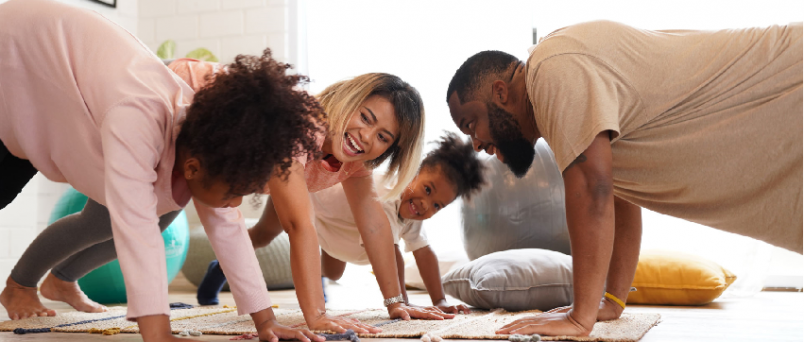A single decision can change your whole life: you can be an athlete, or die of a heart attack; know your contact numbers from top to bottom, or even forget your name.
This single decision is based on choosing a healthy lifestyle, in which you work daily to have good habits that ensure the state of physical and mental health you need to live fully. You have the power to choose to be more alive than ever.
Here doubts begin to arise about “choosing” to be healthy… “What if I inherited it from my parents? This is how my body is! Since I was little I have had this character! I can not do anything about it”.
An interesting fact that will help us break the ice to continue reading is that 95% of diseases are related to lifestyle, chronic stress, and toxic environmental factors. Which leaves us just 5% out of our reach.
Have A Healthy And Conscious Diet

Before recommending any balanced diet, based on personal awareness, you can start with a simple mental exercise: before taking that bite, ask yourself.
Something that will help you get more objective answers is to investigate the fuel that we give our bodies on a daily basis. Consume information on how to have a varied diet, and a suitable weight; there are even entire books or documentaries on proper hydration. Be you who critically choose what balanced diet you should have.
- Eat the whole fruit. The skin contains fiber, a very powerful tool for lowering blood sugar levels. Whole fruit = lower risk of type 2 diabetes.
- Hydrate as if your cells depended on it! Wait… Yes, they do. Drink about 3 liters of water throughout the day. You don’t have to measure it, just try to always have a glass of water nearby (and don’t forget to drink it).
- Remedy for hunger attacks: nuts. In addition to having essential nutrients that are very beneficial for the brain, nuts also reduce the risk of cardiovascular diseases.
- A healthy diet does not hit or glue with processed foods. Forget about the attractive packaging, it is purely marketing, walk more through the vegetable aisle.
- Know the effect of your varied diet. An essential filter for this is: is the food inflammatory? Most diseases, if not all, consist of an inflammatory process. Reduce flour, refined sugar, red meat, milk and derivatives, and alcoholic beverages, among others. Some anti-inflammatories: turmeric, cruciferous, ginger, garlic, avocado, and vegetables in general.
- Physical activity will only tickle if you don’t accompany it by taking care of what you eat. I leave you the trailer of the documentary Fed Up, which explains the relationship between unhealthy eating and exercise:
Rest And Disconnect
Good health is also based on passive activities, such as resting, sleeping, or simply disconnecting.
- Give yourself 7 to 9 hours of sleep a day. Lack of sleep affects both the mind and the body. Important processes that regulate our hormonal and immune systems occur at night.
- Physical well-being is in addition to movement and pauses. Have a break between your daily physical efforts and your rest. Neither sedentary lifestyle nor body overexertion.
- Separate your activities by the environment. This will help you unwind. If you work, eat, study, and rest in the same environment, you will most likely comply with all of them except the last one.
- Enhance your moments of disconnection by spending them outdoors. As well as having physical benefits, being in natural daylight can help you adjust your circadian cycle, which in turn can regulate your sleep and internal processes.
Move Your Body Sweat!
Physical activity can be a great ally to have a better quality of life in both worlds: body and mind.
Sweating will not only help you release toxins, have a healthy weight, or prevent cardiovascular diseases, but it also has a positive impact on an emotional level. Physical exercise results in a chemical process that releases hormones that lift your spirits, improve your self-esteem, and combat depression or anxiety.
There are studies that relate posture to learning ability. How? It turns out that the typical bad postures that we adopt when working or studying at a desk make it difficult for oxygen to reach the brain, and without enough oxygen, the cells do not work optimally, in this case, harming learning.
Learn Something New Every Day
Among the healthy habits, we must have as a rule is to stay active at the brain level.
Do you remember the contrast between knowing many phone numbers by heart and not remembering your name? Both extremes are possible scenarios in time. The good thing is that today you can choose the first by deciding to learn something new every day.
- Listen to TED talks. The knowledge of these talks usually comes from the individual experiences of the one who presents it, which makes it unique knowledge.
- Learn a new language. This generates new neural pathways that are also related to the way your mind solves problems.
- Investigate what they never taught you, the information is at your fingertips.
- Accept challenges that you still don’t know how to do. “Do you have experience in the area? No, but I am willing to learn!”
Look For Reasons To Laugh
It’s hard to force a positive attitude in difficult times. But without a doubt, we can decide to change our mood by at least trying to find reasons to laugh, which can be as simple as watching a stand-up comedy by a comedian we like.
As you have read in each habit, part of that connection and good mental and physical health is based on chemical reactions. Laughter is no exception. When we laugh we release endorphins and hormones like dopamine, limiting the production of cortisol, remember? Yes, the stress hormone.
To have a healthy life, I would not say that laughter is the best medicine, but it is a good pill within our reach.
You may like to read 5 effective ways to recover from serious car accident injuries

